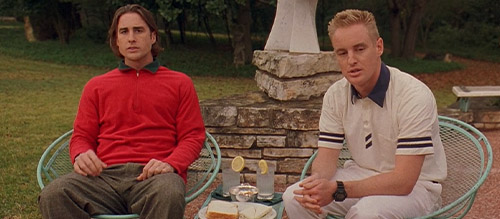
Bottle Rocket (1996)
Director: Wes Anderson
Screenwriters: Wes Anderson, Owen Wilson
Starring: Luke Wilson, Owen Wilson, Robert Musgrave, James Caan, Lumi Cavazos
Wes Anderson’s films have become something of a cultural phenomenon over the past two decades, with his distinctively colourful palettes spawning a series of imitators (and Instagram fan pages) and his quirky, distinctive tone and blend of humour and drama winning fans across the globe. Heavily influenced by the French New Wave of the 1950s and 60s, Anderson has channelled his influences into a unique, idiosyncratic style. Three of his films – The Grand Budapest Hotel, Moonrise Kingdom and The Royal Tenenbaums – made it into the BBC’s poll of the Top 100 Films of the 21st Century in 2016. Prior to the turn of the century, Anderson made two features, his debut coming in 1996 with Bottle Rocket, a feature adaptation of his short film of the same name.
Bottle Rocket sees the first feature collaboration between Wes Anderson and the Wilson brothers (Luke and Owen – both making their film debuts). It is, additionally, a first screenplay collaboration between Owen Wilson and Wes Anderson – the pair have also co-written Rushmore and The Royal Tenenbaums. Bottle Rocket received positive reviews upon its release and has continued to be well received within Anderson’s canon of work in the years since.
Martin Scorsese labelled Bottle Rocket as one of his favourite films of the 1990s. In a four star review for Empire, Kim Newman remarked that it is “A smart little first feature from Wes Anderson […] In an era not exactly short of quirky bungled heist movies, Anderson and Wilson take an interesting tack – coming in late on lifelong relationships, and showing us the pay-offs to friendships and resentments that have been simmering for years”.
Bottle Rocket focuses on childhood friends Dignan (Owen Wilson) and Anthony (Luke Wilson) as they scrape a living through a series of botched heists. Dignan is constantly planning a score larger than the last and is keen on pursuing a criminal life whereas Anthony is the far more reluctant of the two, tied to Dignan by years of friendship. The pair’s relationship is front and centre, and truly the film’s heartbeat, though it comes under strain when Anthony begins to fall for Inez (Lumi Cavazos), a cleaner at the hotel in which the group stay.
The Wilson brothers bounce off each other brilliantly and have strong chemistry in their contrasting roles, offering the first glimpse at the collaborative talents that would of course be revisited in The Royal Tenenbaums (2001). In addition to the Wilson brothers and co-star Robert Musgrave, there is fine support from Lumi Cavazos and the great James Caan (The Godfather; Thief).
While elements of Anderson’s individualistic brand of humour and dialogue are apparent, this is perhaps the most traditional genre film in his catalogue. Bottle Rocket is a heist film first and foremost, and more structured than a lot of the director’s other work, offering a more traditional narrative focus. The Wilson brothers therefore become key to delivering the more Anderson moments of the film, while the language barrier between Anthony and Inez delivers on the comedy front. Bottle Rocket gives us our first glimpse at Anderson’s knack for perfectly timed needle drops too, with the music of The Proclaimers and The Rolling Stones being used to wonderful effect.
Bottle Rocket may not be the most ground-breaking of Wes Anderson’s films, but it certainly offers many of the filmmaker traits that would become discernible from Rushmore (1998) onwards. This 1996 release is in this way vital to understanding Anderson as a filmmaker, as its glimpse at a more straightforward type of Anderson film is critical to recognising the development of his style and some of the collaborations that have become so important to his career. Fans who have arrived to the Anderson party late will perhaps be a little disappointed by Bottle Rocket’s genre-specific intentions and the lack of now typical Andersonisms, but it is a film worth seeking to see how one of modern cinema’s most unique voices began honing his craft. An imaginative debut.
19/24

